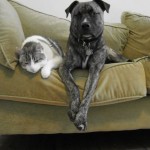Animals as pets – Ask the Rabbi
Q. Does Jewish law approve of having cats and dogs as pets?
 A. Animals feature regularly in Biblical literature – the story of the animals on Noah’s Ark is an example – but they were regarded as mostly meant for utilitarian purposes, e.g. horses to ride on or pull a cart or chariot, oxen and donkeys to plough the ground, cows to give milk, and kosher animals, birds and fish for food.
A. Animals feature regularly in Biblical literature – the story of the animals on Noah’s Ark is an example – but they were regarded as mostly meant for utilitarian purposes, e.g. horses to ride on or pull a cart or chariot, oxen and donkeys to plough the ground, cows to give milk, and kosher animals, birds and fish for food.
Rarely do ancient records mention animals as pets, an exception being a pet dog in the Apocryphal story of Tobit. Isaiah 1 warns that sometimes animals show more loyalty to their owners than human beings do towards God.
The rabbis certainly knew that dogs were loyal (Hor. 13a) but they warned against having “a bad dog” in one’s house (Shab. 63a, BK 15a/b, 79b and 83a).
Maimonides has a strict view. He bans any dog at all unless it is tied up by chains (Niz’kei Mammon 5:9), though others (e.g. Tur, Choshen Mishpat 409) only prohibit bad dogs.
The authorities discuss what constitutes a bad dog. It is not only whether the animal is liable to bite and hurt a human being, but whether its bark might scare a person, especially a pregnant woman (Rashi to BK 79a).
The fear of dogs was obviously always a major issue, and some authorities limit the ownership of dogs to guard dogs which have a practical security purpose.
Antisemites like the Cossacks often used fierce dogs to intimidate and frighten the Jews. The result is that Jews with an Eastern European background are still scared of dogs to this day.
Several of my Jerusalem neighbours walk their dogs in the street, but there are other neighbours who deliberately cross the street so as to keep away from the dogs. One dog-walking neighbour passes our house regularly, and if it is Shabbat he tells me in Hebrew in a loud voice, “The dog doesn’t bite on Shabbat!”
A certain rabbi I knew used to believe that the Jerusalem dogs are the reincarnation of the souls of departed rabbis.
Rabbinic views about cats are generally more lenient, though there was a fear that a wild or uncontrolled cat might cause injury to person or property.
On the other hand, some Rabbis are said to have specially kept cats as pets in order to fulfil the ethical duty of feeding your animals before having your own meal.



